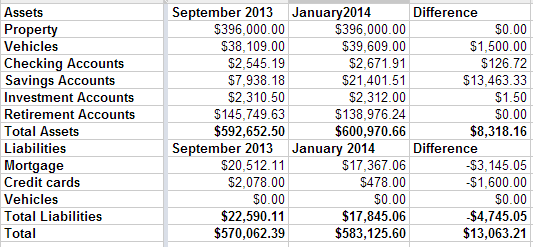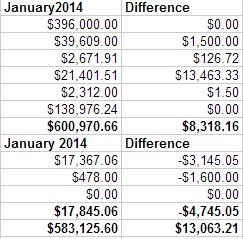- RT @Dave_Champion Obama asks DOJ to look at whether AZ immigration law is constitutional. Odd that he never did that with #Healthcare #tcot #
- RT @wilw: You know, kids, when I was your age, the internet was 80 columns wide and built entirely out of text. #
- RT @BudgetsAreSexy: RT @FinanciallyPoor "The real measure of your wealth is how much you'd be worth if you lost all your money." ~ Unknown #
- Official review of the double-down: Unimpressive. Not enough bacon and soggy breading on the chicken. #
- @FARNOOSH Try Ubertwitter. I haven't found a reason to complain. in reply to FARNOOSH #
- Personal inbox zero! #
- Work email inbox zero! #
- StepUp3D: Lame dancing flick using VomitCam instead or choreography. #
- I approve of the Nightmare remake. #Krueger #
Why I Hate Payday Loans
I hate payday loans and payday lenders.
The way a way a payday loan works is that you go into a payday lender and you sign a check for the amount you want to borrow, plus their fee. They give you money that you don’t have to pay back until payday. It’s generally a two-week loan.
Now, this two week loan comes with a fee, so if you want to borrow $100, they’ll charge you a $25 fee, plus a percent of the total loan, so for that $100 loan, you’ll have to pay back $128.28.
That’s only 28% of actual interest; that’s not terrible. However, if you prorate that to figure the APR, which is what everyone means when they say “I’ve got a 7% interest rate”, it comes out to 737%. That’s nuts.
They are a very bad financial plan.
Those loans may save you from an overdraft fee, but they’ll cost almost as much as an overdraft fee, and the way they are rigged–with high fees, due on payday–you’re more likely to need another one soon. They are structured to keep you from ever getting out from under the payday loan cycle.
For those reasons, I consider payday loan companies to be slimy. Look at any of their sites. Almost none are upfront about the total cost of the loan.
So I don’t take their ads. When an advertiser contacts me, my rate sheet says very clealy that I will not take payday loan ads. The reason for that is–in my mind–when I accept an advertiser, I am–in some form–endorsing that company, or at least, I am agreeing that they are a legitimate business and I am helping them conduct that business.
In all of the time I’ve been taking ads, I’ve made exactly one exception to that rule. On the front page of that advertiser’s website, they had the prorated APR in bright, bold red letters. It was still a really bad deal, but with that level of disclosure, I felt comfortable that nobody would click through and sign up without knowing what they were getting into. That was a payday lender with integrity, as oxymoronic as that sounds.
Carnival Roundup
Live Real, Now was included in two carnivals last week:

Carnival of Personal Finance #348 hosted by Money Qanda
and
Yakezie Carnival hosted by 101 Centavos
Thanks to all of the hosts for including my posts.
Get More Out of Live Real, Now
There are so many ways you can read and interact with this site.
You can subscribe by RSS and get the posts in your favorite news reader. I prefer Google Reader.
You can subscribe by email and get, not only the posts delivered to your inbox, but occasional giveaways and tidbits not available elsewhere.
You can ‘Like’ LRN on Facebook. Facebook gets more use than Google. It can’t hurt to see what you want where you want.
You can follow LRN on Twitter. This comes with some nearly-instant interaction.
You can send me an email, telling me what you liked, what you didn’t like, or what you’d like to see more(or less) of. I promise to reply to any email that isn’t purely spam.
Have a great week!
Carnivals This Week
I seem to be failing frugal parenting. My son spent the entire week telling me how happy he’d be if we could go to the game store so he could spend some of his money. Tying emotions to shopping is badbadbad.
Live Real, Now was included in four carnivals last week:
Carnival of Financial Planning – Edition #224 at AaronHung.com
Yakezie Carnival – Mardi Gras Edition at Young Adult Finances
Canadian Finance Carnival #76 at Canadian Finance Blog
Carnival of Financial Camaraderie – Rain Man Edition at Thirty Six Months
Thanks to all of the hosts for including my posts.
Get More Out of Live Real, Now
There are so many ways you can read and interact with this site.
You can subscribe by RSS and get the posts in your favorite news reader. I prefer Google Reader.
You can subscribe by email and get, not only the posts delivered to your inbox, but occasional giveaways and tidbits not available elsewhere.
You can ‘Like’ LRN on Facebook. Facebook gets more use than Google. It can’t hurt to see what you want where you want.
You can follow LRN on Twitter. This comes with some nearly-instant interaction.
You can send me an email, telling me what you liked, what you didn’t like, or what you’d like to see more(or less) of. I promise to reply to any email that isn’t purely spam.
Have a great week!
7 Benefits of Investing Internationally
 When it comes to financial investments, it’s always better to go with an informed decision than one that relies merely on chance – besides, gambling only works when luck’s on your side. Fortunately, international investments are a financially secure and reliable form of investing as long as you know your limitations. So, in keeping with the idea of sound financial decisions, here are seven benefits of investing internationally:
When it comes to financial investments, it’s always better to go with an informed decision than one that relies merely on chance – besides, gambling only works when luck’s on your side. Fortunately, international investments are a financially secure and reliable form of investing as long as you know your limitations. So, in keeping with the idea of sound financial decisions, here are seven benefits of investing internationally:
Diversification of Your Funds
A diversified financial portfolio gives investors options in terms of economic fluctuations and, by investing internationally, your finances will have alternative sources of stability. In other words, if your money is spread out among various countries, then an economic crash in one country won’t affect other investments.
It goes without saying that with diversification also comes a learned understanding of various global economies and markets, but with the help of a financial adviser or with a little research, you’ll have the ability to make informed global investments, which is always better than the “eggs in one basket” approach.
Investing Abroad Means More Options
Just like there’s diversification with investing internationally, there are also many options when it comes to the way you want to invest your finances. And, with international investing growing in popularity, the investment options available in today’s market are quickly becoming commonplace.
Three of the most popular forms of international investments are mutual funds, exchange traded funds (ETFs), and American depository receipts (ADRs). And, although mutual funds are a common form of investment, ETFs and ADRs trade much like stocks and therefore take a little more financial knowledge to navigate.
International Protection and Confidentiality
If you’re the type of investor that’s worried about financial scares associated with foreclosures and lawsuits, investing internationally has an added advantage of asset protection. With investing abroad, many foreign financial institutions are able to protect your investments from seizure and other threats.
Likewise, investing internationally also comes with confidentiality concerning your finances. International financial institutions are not legally required to divulge your monetary details to anyone. Confidentiality isn’t to say that international investments are exempt from legalities, but they’re entitled to more freedoms.
Investment Growth on an International Level
In terms of household incomes, import/export strengths, younger working populations, and the lean toward free-market economic policies, investing internationally has the potential for more growth than investing in the United States alone, which translates to an increase in return potential in overseas investments.
In fact, according to the International Monetary Fund, the United States is expected to fall below the rest of the world for the next two years when it comes to economic growth. Because of this, companies like Fisher Investments Institutional Group are strategizing toward international investments in strong economic climates across the world.
Currency Diversification Strengthens Portfolios
Much like international investing gives your portfolio safety in numbers as opposed to having all assets invested in one country’s economy, so do currency differences from country to country. In relation to the US dollar, many countries across the world have stronger currencies, which helps boost returns over time.
The flip side of this coin is the idea that fluctuations in currency strengths can just as easily work against your portfolio as they can strengthen it. It’s wise to keep an eye on international currency rates and how they compare to the US dollar, but never invest solely based on rates as a country’s currency can drop in strength overnight.
A Reduction in Taxes
Otherwise known as tax havens, many countries across the world offer attractive tax incentives to foreign investors. These incentives are meant to strengthen other country’s investing environments as well as attract outside wealth.
These tax incentives are particularly attractive to US investors due to the increasingly high taxes in the country. As a result, the United States government is creating more defined restrictions and laws when it comes to international investment tax incentive regulations.
Investment Potential in the United States is Dwindling
Because the United States has both the world’s largest economy and stock market, financial opportunities are almost maxed out due to over-investing. On the other hand, emerging markets in other countries are growing in size and strength, which is quickly resulting in stronger economies and more investment opportunities.
By ignoring the potential of other world markets, you’re also ignoring global economies and stock markets that offer unforeseen investment potential when compared to the United States, which is something every investor should keep in mind.
So, from portfolio diversification to investment growth, investing internationally is a great way to expand your financial horizons.
This is a guest post.
Net Worth Update – January 2014
This may be the most boring type of post I write, but it’s important to me to track my net worth so I can see my progress. We are sliding smoothly from debt payoff mode to wealth building mode.
Our highlights right now are nothing to speak of. We did let our credit card grow a little bit over the last couple of months, but paid it off completely at the end of December. It grew mostly as a matter of not paying attention while we were doing our holiday shopping and dealing with some car repairs.
That’s it. We haven’t remodeled our bathrooms yet, but we have the money sitting in a savings account, waiting for the contractor. We haven’t bought a pony yet, but we did decide that a hobby farm wouldn’t be the right move for us. We’ll be boarding the pony instead of moving, at least for the foreseeable future.
Our net worth is up $13,000 since September. Our savings are up and our retirement accounts are down because there are two inherited IRAs that we need to slowly cash out and convert to regular IRAs.






